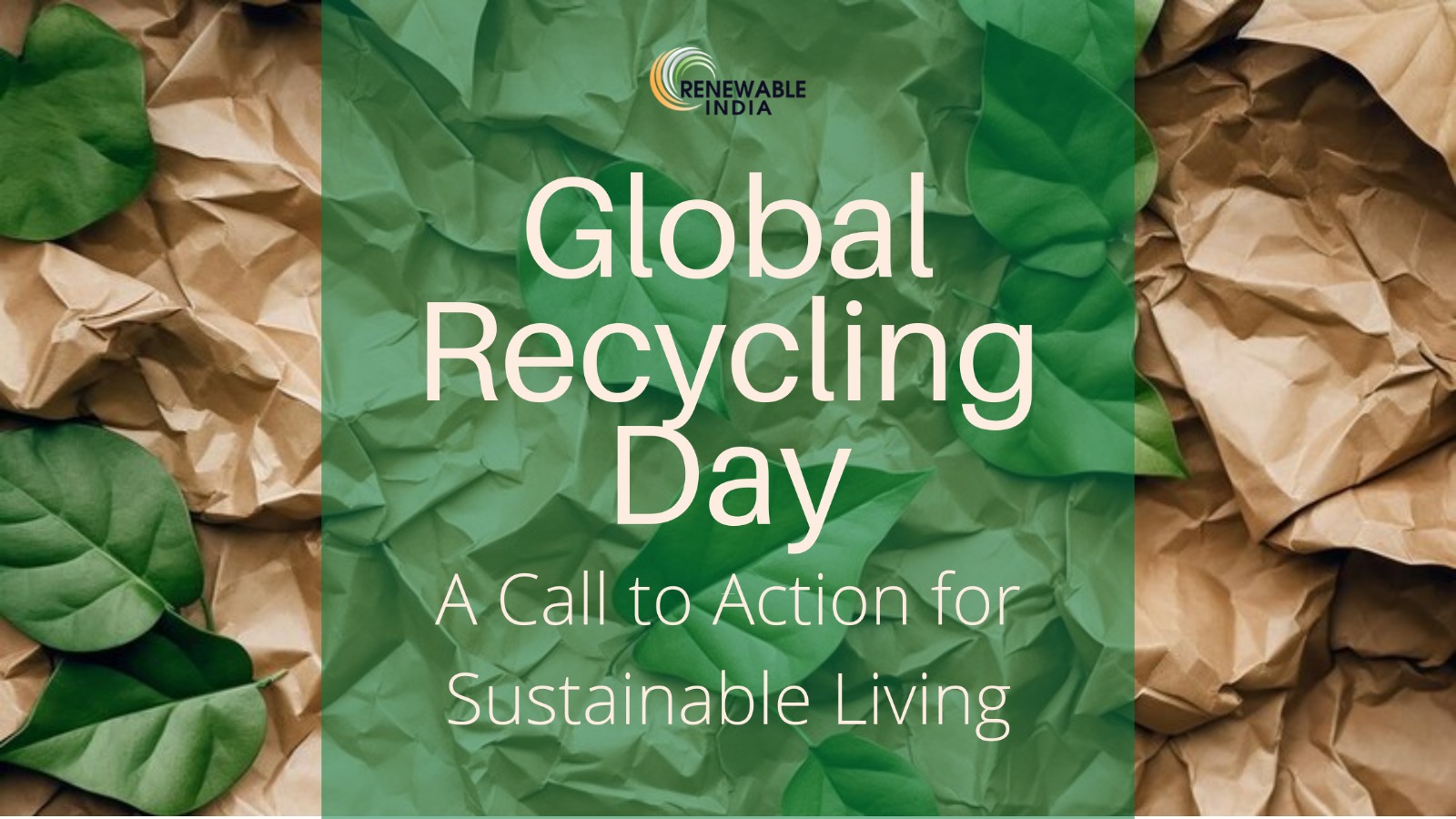
Global Recycling Day, observed annually on March 18th, is a global initiative aimed at raising awareness about the importance of recycling and encouraging individuals and communities to take action towards a sustainable future. This day serves as a reminder of the critical role recycling plays in preserving our environment and conserving valuable resources.
Global Recycling Day is a worldwide initiative aimed at raising awareness about the importance of recycling. It serves as a reminder of the critical role each individual plays in preserving our environment for future generations. Recycling isn’t just a mundane task; it’s a powerful tool for reducing waste and conserving resources.
Why should you recycle? The answer is clear: recycling is a simple yet impactful way to contribute to environmental sustainability. By recycling materials at home and in the workplace, you actively participate in reducing pollution, conserving energy, and minimizing the strain on natural resources. Every item you recycle helps divert waste from landfills and incinerators, reducing the environmental footprint of your daily activities.
Mr. Ranjit Singh Baxi, from the Bureau of International Recycling, spearheaded the creation of Global Recycling Day in 2015. Observed annually on March 18th, this global initiative aims to promote environmental awareness and sustainable practices.
The topic of Global Recycling Day 2024 is “Recognising Youth: Recycling Heroes,” which highlights the critical role that young people play in promoting sustainable practices. This subject emphasises how young people are not simply the movement’s future leaders but also its active participants.
The key is to recognise the youth’s vitality and inventiveness as key factors in creating a sustainable present. This theme’s new competition aims to find and honour young activists who are actively engaged in waste management and recycling. It highlights how important young involvement is in providing new ideas and creative solutions to waste management problems. The competition aims to motivate people to adopt eco-friendly practices and build a culture of sustainability by showcasing and celebrating youth-led efforts.
Youth celebration as Recycling Heroes emerges as a pivotal story in this campaign. The competition provides a forum for sharing success stories, encouraging healthy rivalry, and building a community of people who share a commitment to sustainable living.
Honouring and applauding the accomplishments of young Recycling Heroes is essential to spurring a more widespread cultural change towards conscientious waste management. In addition to honouring today’s Recycling Heroes, empowering the next generation will guarantee a legacy of environmental stewardship and pave the road for a more resilient and sustainable Earth.
This event was first celebrated on 18th March 2018. The Global Recycling Foundation organised the inaugural Global Recycling Day celebration in 2018. The day was created to draw attention to the urgent problems of resource depletion, waste production, waste treatment and environmental deterioration. It has gained momentum over time, and several recycling-related festivals and activities have been planned all around the world.
The global recycling symbol, recognized worldwide, features three arrows chasing each other in a Möbius strip formation. Represented as either U+2672, UNIVERSAL RECYCLING SYMBOL or U+267B ♻ BLACK UNIVERSAL RECYCLING SYMBOL in Unicode, it serves as a universally understood icon for recycling efforts.

One of the central themes of Global Recycling Day is turning waste into opportunity. This concept emphasizes the transformative power of recycling, where waste materials are converted into valuable resources. Recycling not only reduces the strain on natural resources but also minimizes the environmental impact of waste disposal.
Global Recycling Day matters for several reasons. Firstly, it helps mitigate the adverse environmental effects of excessive waste generation, including pollution and habitat destruction. Recycling also plays a crucial role in conserving natural resources by reducing the need for raw materials, thereby contributing to sustainable development. Additionally, recycling helps decrease energy consumption, as the production of goods from recycled materials typically requires less energy than producing them from scratch.
India, with its growing population and rapid industrialization, faces significant waste management challenges. However, the country has been making strides in promoting recycling initiatives. Various government and non-governmental organizations are working towards creating awareness and establishing efficient waste management systems. Cities like Mumbai and Bengaluru have implemented waste segregation and recycling programs to reduce the burden on landfills. The concept of turning waste into opportunity is gaining traction in India, with initiatives that focus on creating livelihoods through recycling and promoting a circular economy.
The government is actively creating a legislative framework to encourage the use of biodegradable plastics as a practical substitute for single-use plastics in addition to the prohibition on them. To guarantee a long-lasting influence, further powerful policy measures can be put into place.
Taxes on landfills and incineration are one such tactic used in India to encourage recycling rather than the careless disposal of garbage. In addition, a “pay-as-you-throw” system that charges residents a variable fee based on the weight of mixed waste bags might be approved.
Addressing the entire life cycle of plastic bags, from manufacturing or imports to disposal, is crucial. This entails comprehensive regulation to ensure responsible practices throughout the entire process. Additionally, providing specific incentives to the bioplastics industry, such as corporate income tax exemptions, support for infrastructure development, and reductions in installation costs, is essential for fostering its growth and sustainability.
India established a recycling target of 60 percent for electrical and electronic waste for financial year 2024. This target is set to increase by 10 percent every two years, reaching an e-waste recycling rate of some 80 percent by financial year 2029.
Recycling targets for electrical and electronic waste in India from FY 2024 to FY 2029.
In conclusion, Global Recycling Day serves as a global platform to inspire action and highlight the importance of recycling in building a sustainable future. The theme of Recognising Youth as “Recycling Heroes” in 2024 reinforces the idea that youngsters have a crucial role to play in the recycling journey. Turning waste into opportunity not only benefits the environment but also contributes to the creation of a more sustainable and resilient world. As we celebrate Global Recycling Day, let us reflect on our individual and collective responsibilities in preserving the planet for future generations.
Global Recycling Day is an annual event celebrated on March 18th, dedicated to raising awareness about the importance of recycling and promoting sustainable practices globally.
Global Recycling Day is celebrated on March 18th each year. It was first observed in 2018 and has since become a global initiative to address waste management issues and promote recycling awareness.
Global Recycling Day is significant because it addresses pressing environmental issues, such as pollution and resource depletion. It promotes sustainable development by conserving natural resources, reducing energy consumption, and encouraging responsible waste management practices.
India faces waste management challenges due to its growing population and rapid industrialization. However, the country is actively working on promoting recycling initiatives, including waste segregation programs in cities like Mumbai and Bengaluru. These efforts aim to reduce the burden on landfills and create a circular economy.
The focus on youth recognizes their potential as active contributors to shaping a sustainable present and future. Their energy, creativity, and innovative ideas are considered instrumental in addressing pressing environmental challenges and fostering a culture of sustainability.
Revolutionizing Recycling: Turning Cigarette Butts into Eco-Friendly Treasures
Leave a Reply